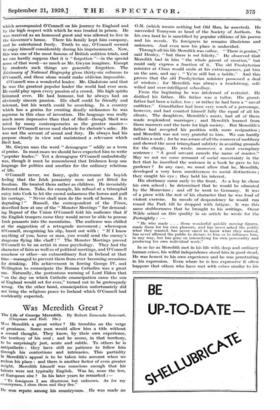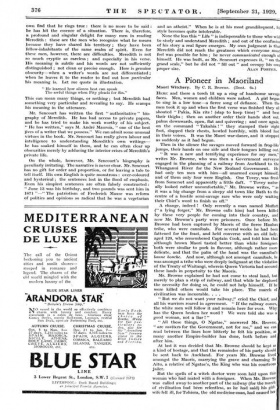Was Meredith Great ?
The Life of George Meredith. By Robert Esmonde Sencourt.
(Chapman and Hall. Ills.) .
Wes Meredith a great writer ? He trembles on the verge of greatness. Some men would allow him a title without a second thought. They know, by their own experience, the territory of his soul ; and he seems, in that territory, to be surprisingly just, acute and subtle. To others he is antipathetic : they have still no patience to follow him through his contortions and intricacies. This partiality In Meredith's appeal is to be taken into account when we reckon his place : and there is another factor of even greater weight. Meredith himself was conscious enough that his talents were not typically English. Was he, none the less, of European size ? In his later years he remarked
" To foreigners I am illustrious but unknown. As for my countrymen, I shun them and they flee."
Ne won- repute among. Ids countrymen. He was made an
O.M. (which means nothing but Old Man, he asserted). He succeeded Tennyson as head of the Society of Authors. In his own land he is sanctified by popular editions of his poems and his novels. To foreigners he remains illustrious and unknown. And even now his place is undecided. Through all his life Meredith was callow. " There is genius," said Henley, " but there is not felicity." He observed that Meredith had in him " the whole gamut of creation," but could only express a fraction of it. The old Presbyterian minister at Cloan would smile at his extravagances, pat him on the arm, and say : " Ye're still but a laddie." And this proves that the old Presbyterian minister possessed a deal of wisdom ; for Meredith was always a headstrong, self- willed and over-intelligent schoolboy.
From the beginning he was intolerant of restraint. He disliked his father. His father was a tailor. His grand- father had been a tailor, too ; or rather he had been a " naval outfitter." Grandfather had been very much of a personage, however, and had counted himself fully the equal of all his clients. The daughters, Meredith's aunts, had all of them made resplendent marriages ; and Meredith learned from them manners and the taste for high society. But Meredith's father had accepted his position with more resignation ; and Meredith was not very grateful to him. We can hardly call him a snob ; for he was aware of all the nuances of snobbery and showed the most triumphant subtlety in avoiding grounds for the charge. He wrote, moreover, a most exemplary sentence : " A good servant cancels the name of master."
May we not see some remnant of social uncertainty in the fact that he inscribed the sentence in a book he gave to his gardener ? In any case, we must allow that he, Meredith, developed a very keen sensitiveness to social distinctions ; they caught his eye ; they held his interest.
His obstinacy came early to the front. As a boy he chose his own school ; he determined that he would be educated by the Moravians ; and off he went to Germany. It was of a piece with the rest of his character that he was fond of violent exercise. In moods of despondency he would run round the Park till he dropped with fatigue. It was this same stubbornness that he brought to his writings. Oscar Wilde seized on this quality in an article he wrote for the Fortnightly : -
" He who made . . . those wonderful quickly moving figures, made them for his own pleasure, and has never asked the public what they wanted, has never cared to know what they wanted, has never allowed the public to dictate to him or to influence him, in any way, but has gone on intensifying his own personality and producing his own individual work."
In so far as Meredith met in his life with deep and ordinary human crises, his wilful independence stood him in good stead.
He was honest to his own experience and he was penetrating in his expression. Even where he is less expressive it often happens that others who have met with crises similar to his
own find that he rings true : there is no more to be said : he has hit the essence of a situation. There is, therefore, a profound and singular delight for many men in reading Meredith : these are the men who recognize what he means because they have shared his territory ; they have been fellow-inhabitants of the same realm of spirit. Even for these men, however, there are difficulties. Meredith is not so much cryptic as careless ; and especially in his verse. His meaning is subtle and his words are not sufficiently distinguished ; not clean or precise enough. Here is genuine obscurity—when a writer's words are not differentiated when he leaves it to the reader to find out how particular his meaning is. Let me quote in illustration.
" He learned bow silence best can speak
The awful things when Pity pleads for Sin."
This can mean many things, or nothing ; but Meredith had something very particular and revealing to say. He scamps his meaning in the utterance.
Mr. Sencourt has written the first " authoritative " bio- graphy of Meredith. He has had access to private papers, and he has tried to make his work worthy of his subject.
He has written," says M. Andre Maurois, " one of the best lives of a writer that we possess." We can admit some unusual virtues in the book. Mr. Sencourt has really given labour and intelligence to understanding Meredith's own writings— he has soaked himself in them, and he can often clear up obscurities merely by adducing the interior crises of Meredith's private life.
On the whole, however, Mr. Sencourt's biography is peculiarly irritating. The narrative is never clear. Mr. Sencourt has no gift for order and proportion, or for leaving a tale to tell itself. His own English is quite monstrous : over-coloured and hysterical ; the sentences lost in the flood of emphasis. Even his simplest sentences are often falsely constructed : " June 13 was his birthday, and two pounds was sent him in 1871 "—" The patriotism of Frederick Maxse was reform of politics and opinions so radical that he was a vegetarian and an atheist." When he is at his most grandiloquent, hi, style becomes quite intolerable.
- None the less this " Life " is indispensable to those who wist to study and understand Meredith ; and out of the confusion of his story a real figure emerges. - My own judgment is that Meredith did not reach the greatness which everyone .must feel was possible for him ; he never communicated enough of himself. He was built, as Mr. Sencourt expresses it, " on the grand scale," but he did not " fill out " and occupy his own













































 Previous page
Previous page